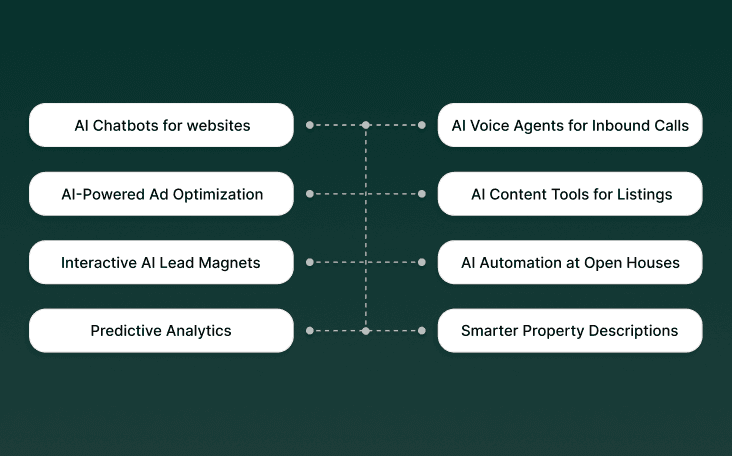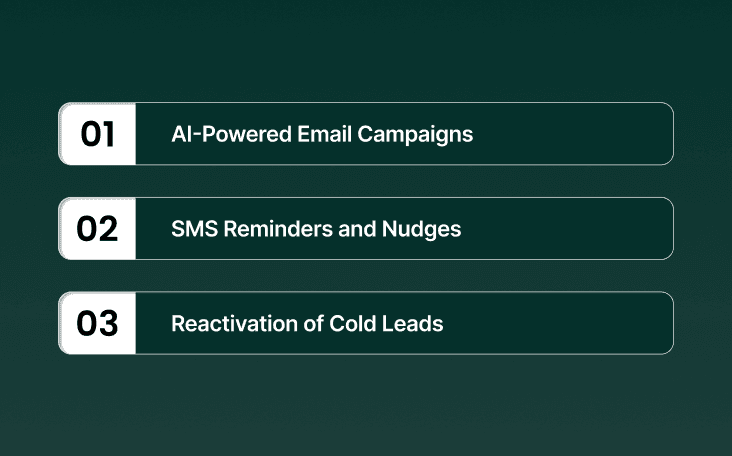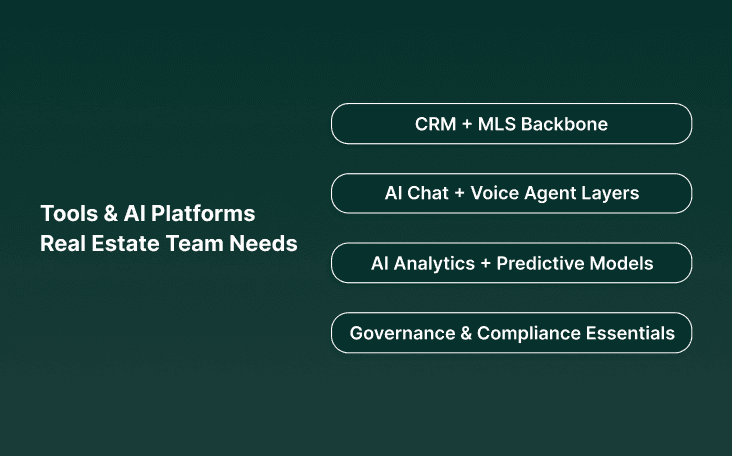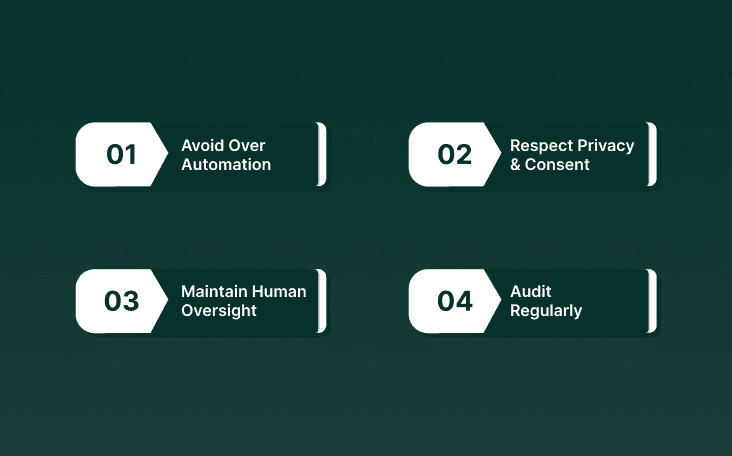Discover how to use AI to generate real estate leads, qualify buyers and sellers faster, and scale your business with AI lead qualification tools.

Akshat Mandloi
Updated on
December 26, 2025 at 11:28 AM
Generating quality real estate leads has always been the lifeblood of a successful brokerage or solo practice. But the landscape has shifted—buyers and sellers expect instant responses, competition is fiercer than ever, and traditional lead-gen tactics often fall short on both speed and efficiency.
That’s where artificial intelligence (AI) comes in. Far from being a buzzword, AI is becoming a practical tool for real estate professionals to capture, qualify, and nurture leads more effectively. From chatbots that engage late-night website visitors to voice agents that handle after-hours calls, AI is helping agents spend less time chasing and more time closing.
In this blog, you’ll learn how to use AI to generate real estate leads, qualify buyers and sellers with precision, and build scalable systems that work around the clock. We’ll also explore proven tactics, tools, and workflows you can adopt in the next 90 days.
Key Takeaways
Speed-to-lead wins deals: AI chatbots and voice agents let you respond instantly, 24/7, so you never lose a motivated buyer or seller.
Qualification is where AI shines: AI scoring models and structured intake workflows ensure agents focus only on the most conversion-ready leads.
AI isn’t one tool, it’s a stack: Success comes from layering AI chat, voice, predictive analytics, and nurturing tools on top of your CRM + MLS.
Adoption is a 90-day playbook: Start with chat/voice, expand to ad optimization and lead scoring, then scale across all channels with measurable ROI.
Balance automation with humanity: AI handles repetitive first touches, but human agents must own the relationship and final decision-making.
Why Real Estate Professionals Are Turning to AI for Lead Generation
Real estate has always been about speed and relationships—the faster you respond, the more likely you are to win the client. But with inboxes flooded, calls missed, and rising costs per lead, traditional methods are no longer enough.
That’s where AI comes in. Today’s tools can:
Respond instantly to inquiries on your website or phone line, so you never miss a lead.
Score and qualify prospects based on behavior, budget, and readiness to move.
Automate nurturing with personalized touchpoints across email, SMS, and even outbound calls.
For agents and brokerages, the impact is measurable: shorter response times, higher contact rates, and more qualified appointments booked. In other words, AI doesn’t just find more leads, it helps you close better ones.
How to Use AI to Generate Real Estate Leads: 8 Proven Tactics

1. AI Chatbots for Real Estate Websites
A prospective buyer lands on your property page at 11 p.m. Without AI, they leave a form fill that may or may not get answered the next morning. With an AI chatbot in place, that same visitor can ask questions, pull property details from the MLS, and even schedule a showing right away.
AI chatbots work best when:
They’re connected to your CRM and MLS so they can surface real listings.
They capture structured data (budget, timeline, location) for qualification.
They escalate seamlessly to a human agent when the lead is serious.
This doesn’t just increase form fills—it also reduces drop-offs from unresponsive or delayed follow-up.
Recommended next read: How to Set Up AI Agents for Better Customer Support — while written for support, the same principles apply for lead capture in real estate.
2. AI Voice Agents for Inbound and After-Hours Calls
Many brokerages lose leads simply because calls go unanswered. AI voice agents solve this by picking up instantly, day or night, in a voice that sounds natural and professional. They can:
Answer common questions (listing availability, square footage, open house times).
Qualify leads by asking about financing readiness or moving timelines.
Route high-intent callers directly to your phone or calendar.
What makes these voice agents different from old-school IVRs is their real-time, barge-in friendly design—they can handle interruptions and back-and-forth just like a human conversation.
For real estate, that means you never lose a motivated buyer because they called outside business hours.
See how this works under the hood: Why Streaming Architecture Is Non-Negotiable for Real-Time Voice Agents.
3. AI-Powered Ad Optimization and Targeting
Running ads on Google or Facebook is expensive if you’re guessing. AI tools now analyze campaign performance in real time, shifting budget toward high-performing keywords, audiences, or creative.
For example:
Generate multiple ad headline and image variations automatically.
Predict which demographic segments are most likely to click and convert.
Adjust bidding strategies based on lead quality, not just impressions.
The result is lower cost per lead and a steady pipeline of prospects who are a better fit for your listings.
4. AI Content Tools for Listings, Posts, and Social Media Captions
Writing listing descriptions and constant social content is a time sink. AI can draft clear, engaging copy for:
MLS property descriptions (with local keyword emphasis).
Social posts announcing open houses or just-sold homes.
Captions for short-form videos and Instagram reels.
The key is not to let AI write in a generic way—always edit for brand voice, compliance, and accuracy. But with the grunt work handled, your team can focus on the creative touches that make listings stand out.
5. Interactive AI Lead Magnets (Valuations, Calculators, Quizzes)
Buyers and sellers want instant insights:
“What’s my home worth today?”
“How much house can I afford?”
“Which neighborhood is right for me?”
AI can power interactive calculators and quizzes that deliver those answers instantly—while capturing structured data like budget, property type, and location. Leads generated through these tools are higher intent because they’ve already invested time in your funnel.
6. AI Automation at Open Houses and Events
QR codes linked to AI chat or voice flows can streamline data capture at open houses. Instead of paper sign-in sheets, visitors scan and answer a few quick questions. AI follows up automatically with property details, neighborhood reports, or even a “thank you” call.
This ensures every visitor becomes a trackable lead in your CRM—no handwriting deciphering, no missed follow-ups.
7. Predictive Analytics for Neighborhood and Geo-Targeting
AI models can spot patterns in property searches, rental data, or demographic shifts. That means you can target:
Renters likely to be moving within six months.
Families searching in school districts with rising enrollment.
Owners in neighborhoods where turnover is historically higher.
Instead of marketing to everyone, you zero in on those most likely to transact. That precision reduces ad waste and boosts ROI.
8. Smarter Property Descriptions With AI
Good copy sells homes. AI can quickly draft multiple description versions tailored for:
Investors (ROI, rental potential).
First-time buyers (affordability, neighborhood amenities).
Luxury clients (design, exclusivity).
This personalization makes listings resonate better with different buyer personas, while still keeping the process efficient for agents.
Pro tip: You can go a step further by giving each persona a consistent voice—see AI Voice Cloning in Real-Time for how brokerages can keep messaging on-brand across calls, ads, and nurture campaigns.
AI for Real Estate Lead Qualification: From Capture to Conversion
Capturing leads is only half the battle. In real estate, the real value comes from knowing who’s worth your time. That’s where AI-driven qualification helps.
What counts as a qualified real estate lead?
They’ve expressed genuine interest (asking about financing, scheduling a showing).
They meet basic criteria (budget, location, readiness to transact).
They’re likely to convert within a defined timeframe.
Traditional qualification requires hours of manual calls and data entry. With AI for real estate lead qualification, you can:
Score leads automatically based on behavior (e.g., how many listings they viewed, how quickly they responded to follow-ups).
Enrich profiles with external data like creditworthiness or local purchase history.
Route top-tier leads to an agent immediately, while nurturing lower-intent prospects with automation.
By the time an agent picks up the phone, they already know whether they’re talking to a hot lead or someone just browsing.
AI Lead Qualification for Real Estate: Practical Workflows
AI is most effective when embedded into everyday workflows. Here’s how agents and teams can apply it across different lead types:
Buyer Lead Intake
Step 1: AI chatbot or voice agent greets the buyer and collects details: budget, location, type of property.
Step 2: AI scores the lead based on seriousness (pre-approved for a mortgage? looking to buy within 90 days?).
Step 3: Qualified buyers are routed to a showing scheduler or human agent instantly.
Seller Lead Intake
Step 1: Homeowner interacts with an AI valuation tool (“What’s my home worth?”).
Step 2: AI enriches the data with MLS comps and neighborhood turnover rates.
Step 3: High-scoring seller leads get a call from a voice agent offering a free CMA appointment.
Investor Lead Intake
Step 1: Investor specifies criteria—cap rate, neighborhood type, property size.
Step 2: AI cross-references listings and highlights matches.
Step 3: Leads are tagged and prioritized in the CRM for the investment team.
In each workflow, the result is the same: less time chasing cold leads, more time focusing on clients ready to act.
For a deeper dive into how real-time systems enable smooth conversations, see What Makes a Real-Time Agent Truly Real-Time.
Nurturing Real Estate Leads With AI: Email, SMS, and Follow-Ups

Even the best-qualified leads won’t convert if they’re left waiting. Consistent, personalized follow-up is where AI excels.
AI-Powered Email Campaigns: Instead of sending generic drip emails, AI can segment leads into categories—first-time buyers, downsizers, investors—and tailor content to each group. Example: A buyer gets mortgage tips, while a seller receives local sales reports.
SMS Reminders and Nudges: Text messages still get the highest open rates. AI can trigger SMS reminders for showings, open house invites, or even “just listed” alerts that match a buyer’s criteria.
Reactivation of Cold Leads: AI can monitor old inquiries and re-engage them with context-aware outreach—like a message when a new property matches their past searches.
Done right, AI nurturing ensures no lead slips through the cracks, while still keeping communication warm and human.
Tools and AI Platforms Every Real Estate Team Needs

There’s no single “AI button” for lead generation—it’s about layering the right tools on top of your existing systems.
CRM + MLS Backbone
Your CRM should be the source of truth for all contact data, while MLS integration keeps listings fresh and accurate.AI Chat + Voice Agent Layers
This is where Smallest and similar platforms shine—offering real-time, natural-sounding AI that can answer questions, qualify leads, and book appointments.AI Analytics + Predictive Models
These tools help prioritize leads, forecast which neighborhoods will heat up, and suggest the best outreach strategy for each segment.Governance and Compliance Essentials
Always look for providers who meet standards like SOC 2, HIPAA (for healthcare-adjacent data), and TCPA-safe consent collection. It protects both your brokerage and your clients.
Measuring Success of AI Lead Generation in Real Estate
Adopting AI isn’t about novelty—it’s about results. The key metrics to track include:
Speed-to-Lead: How quickly are inquiries answered? AI should bring this to near-instant.
Contact Rate: Percentage of leads you actually speak with after initial outreach.
Qualification Rate: How many contacts meet your defined criteria for a “qualified” lead?
Appointment Conversion: The share of qualified leads that convert to meetings or showings.
Closed Transactions: The ultimate measure of ROI.
By tracking these, you’ll know whether your AI stack is improving efficiency, not just adding noise.
For related benchmarks, check out What We Learned From Benchmarking Real-Time AI Agents.
30-60-90 Day AI Implementation Plan for Real Estate Teams
Rolling out AI in your brokerage doesn’t have to be overwhelming. Breaking it into phases keeps adoption smooth and measurable.
First 30 Days: Quick Wins
Add an AI chatbot to your website to handle inquiries.
Set up AI voice agents for after-hours call coverage.
Connect tools to your CRM so new leads sync automatically.
Next 60 Days: Optimization
Test AI ad optimization for one or two campaigns.
Add predictive scoring to prioritize new leads.
Launch AI-powered email and SMS nurture flows.
By 90 Days: Scale and Refine
Roll out AI across all lead intake channels—web, phone, ads, events.
Train your team to work alongside AI (knowing when to step in).
Start measuring ROI with the metrics outlined earlier.
By the end of 90 days, you should have a measurable lift in speed-to-lead, qualification rate, and appointment conversions.
Risks, Compliance, and Best Practices in Real Estate AI

AI is powerful, but success requires responsibility:
Avoid Over-Automation: Prospects still want human connection. Use AI to handle the first touch, then transition hot leads to an agent quickly.
Respect Privacy and Consent: Follow TCPA, GDPR, and local data protection laws. Always capture explicit consent for outreach.
Maintain Human Oversight: AI can handle 80% of repetitive tasks, but sensitive conversations—like negotiating offers—should remain human-led.
Audit Regularly: Review AI conversations and campaigns monthly to ensure accuracy, compliance, and tone consistency.
Handled with care, AI becomes a trusted extension of your team—not a replacement.
Final Thoughts
AI is no longer a futuristic idea—it’s a practical advantage in a crowded real estate market. From instant lead capture to smarter qualification and consistent nurturing, the agents who adopt AI now will be the ones winning more listings and closing more deals in the years ahead.
But success depends on the tools you choose. Generic chatbots or outdated IVRs won’t cut it. What’s needed is AI that’s fast, natural-sounding, and built for real-time conversations.
That’s where Smallest.ai comes in. With industry-leading low latency (sub-100ms), multilingual capabilities, and enterprise-grade compliance, Smallest’s AI voice agents and chat solutions are designed to capture and qualify leads as if you had a human team working 24/7. Whether you’re a solo agent trying to manage after-hours calls, or a brokerage looking to scale lead intake across multiple offices, Smallest makes it possible to:
Respond instantly to inbound calls and web inquiries.
Qualify leads automatically with context-aware voice or chat flows.
Integrate seamlessly with your CRM, so every lead is tracked and followed up.
Scale reliably without sacrificing human-like quality.
In short: if you want to move from more leads to better leads—and more closed deals—AI is the way forward, and Smallest provides the real-time infrastructure to make it happen.
Ready to see what real-time AI can do for your real estate business? Explore how Smallest.ai helps real estate teams generate and qualify leads, or book a demo to experience AI voice agents in action.
FAQs on AI for Real Estate Lead Generation
1. How can AI help generate real estate leads?
AI helps by automating lead capture on websites, optimizing ad targeting, responding instantly to inquiries, and qualifying leads with predictive scoring. This means agents spend less time chasing cold leads and more time closing deals.
2. Is AI lead qualification for real estate accurate?
Yes—when integrated with your CRM and MLS, AI can analyze buyer intent signals (like budget, search behavior, and response speed) with high accuracy. It’s not flawless, but it filters out low-intent inquiries effectively.
3. What’s the best AI tool for real estate lead qualification?
There isn’t a single “best” tool. A strong stack includes:
AI chatbots (for web capture),
AI voice agents (for inbound/outbound calls),
Predictive scoring tools (inside your CRM), and
Ad optimization platforms.
The right mix depends on your budget and team size.
4. Can AI replace real estate agents?
No. AI handles repetitive tasks like first response, data entry, and scheduling. But relationship-building, negotiation, and closing still require human expertise. AI is a partner, not a replacement.
5. How much does AI for real estate lead generation cost?
Entry-level chatbots can start for free or <$100/month. More advanced voice AI and predictive systems range from a few hundred to several thousand dollars monthly, depending on call volumes and features.
6. Is AI lead generation compliant with privacy laws?
Yes, if implemented properly. Agents and brokerages need to ensure compliance with TCPA, GDPR, and local data laws. Look for vendors with SOC 2 or HIPAA-grade security, and always collect explicit consent for outreach.


